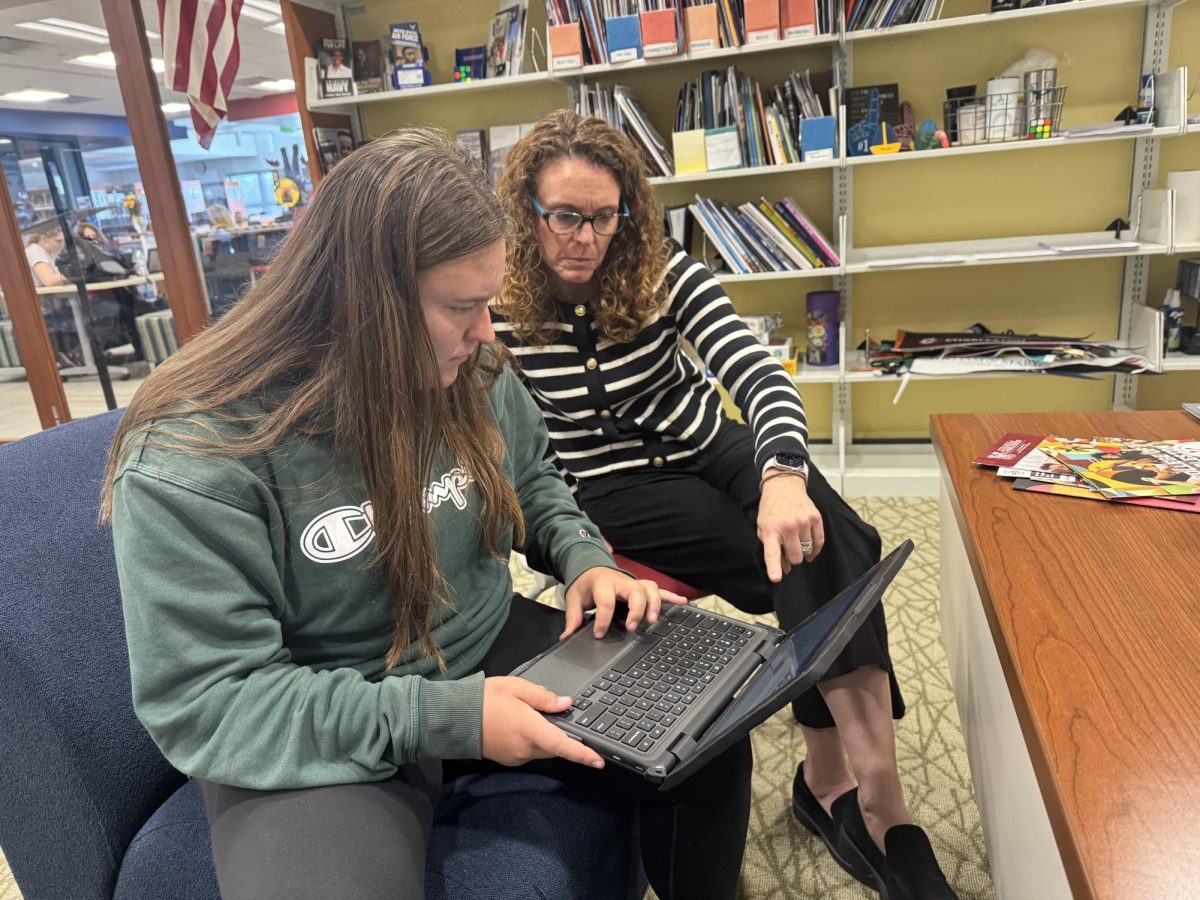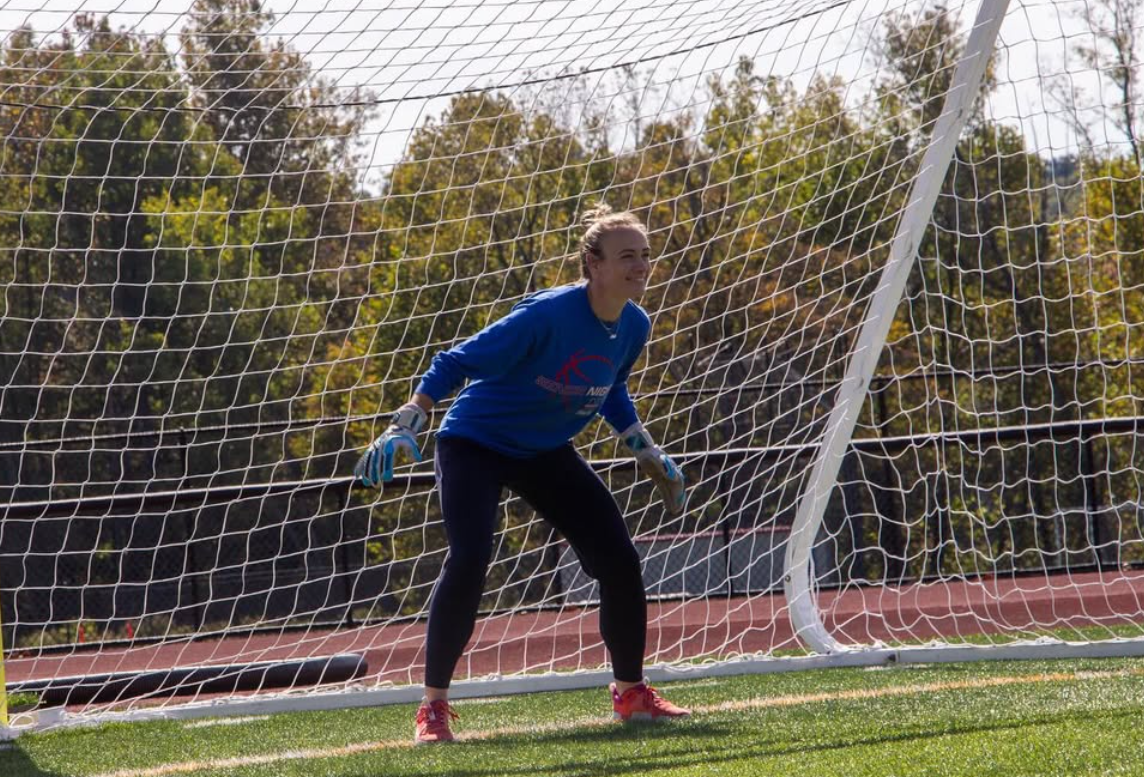WOODBURY ー As college admissions deadlines approach, Nonnewaug High School seniors are turning to early action and early decision applications, seeking a leg-up in a competitive pool of applicants as they aim to secure spots at their dream universities.
In the college application process, students face three key decision timelines: early action, early decision, and regular decision. Each option offers distinct advantages and impacts the overall college experience.
Early Action
Early action is a way for students to submit college applications early in a non-binding way. The deadline is typically early November, unlike the regular decision which is in January. Students will receive an answer much faster. This process allows students to demonstrate their interest in a school while keeping their options flexible.
Kathy Green, Nonnewaug’s College and Career Resource Center counselor, knows the advantages and disadvantages of early action.
“There is no advantage to earning an acceptance for early action,” says Green. “The only advantage is that a student is able to complete the process early, so they are able to send many applications typically before the holidays and they’ll even hear back from some schools before the holidays. The process is completed in an earlier time frame than if they applied for regular decision, which typically has deadlines after the new year.”
Some seniors are still figuring out college, but senior Eva Ripperger knows what she wants.
“Sometimes [early action] gives you a leg up depending on the college that you’re applying to,” says Ripperger, whose top choice is Clemson University. “Sometimes they take into consideration that you’re willing to do their early action just because it shows you have a high level of interest, and not only that, but you find out sooner which is crucial for me so that I can figure out where I’m going in time for my future.”
Senior Zach Cordova was encouraged to do early action so if all else fails he has time for a backup plan.
“My mother told me early action would be a great choice for me and for my educational future,” said Cordova, who applied to schools like Vermont State and the University of Southern Maine, “and if everything goes wrong with that, then there is time for a backup plan.”
Durkin Stankevich, a senior, chose early action to get a head start on the admission process.
“I’m doing early action because I want to be notified of where I got into earlier and also because of higher acceptance rates,” said Stankevich, whose top choice is Boston University. “Although the acceptance rate for early decision is the highest, I chose not to do it because I don’t want to make a definite decision before I do more research on the schools I want to go to.”
Senior Alexa Sweeney chose early action in hopes of solidifying a spot in a nursing program.
“I chose early action when applying to my schools this year because it helps to allow me to focus on scholarships earlier and hear back from my schools sooner,” Sweeney said. “I know a lot of the schools I applied early action for give out scholarships for applying early action. I plan on becoming a nurse, so early action is extremely beneficial for me because there are only a certain number of spots available in nursing programs, so it’s helpful, and hopefully I get a spot before they fill up.”
Early Decision
Early decision is a way for students to submit college applications early in a legally binding way. If the student is accepted to their choice of school they have to withdraw all other applications as they are legally bound to that school. Overall, it’s a good option for students who are certain about their first-choice college and are ready to make a commitment.
Just like early action, Green explains why early decision is a good option for seniors.
“Students choose to do early decision because there can be an advantage to early acceptance,” says Green. “So typically your school and your stats are maybe a little below [standard], it does give you an advantage because it does essentially say to the college that, ‘If you choose me, I’m 100% in,’ so their yield rate is 1-to-1, whereas they may offer acceptances to students with early action or regular decision, but they aren’t guaranteed to get those students to commit to their schools. So students see the advantage in being accepted as well as if a student absolutely 100% loves that school, they will take advantage of getting that commitment early in the year and getting down with the process.”
Senior Gwen Scozzafava chose early decision to show her dedication to the University of Connecticut.
“I chose to do early decision for UConn because I’m fully committed to that school,” said Scozzafava. “I think that when you put down that you’re legally binding yourself to that school that it betters your chances of getting in.” I’ve had my heart set on UConn for a while and I don’t want to go anywhere else so I’m not scared that it’s legally binding. But, if I don’t get in, I have some other colleges on my list I’ll have to apply to.
Senior Thomas Lengyel chose to do early decision to accept the benefits his school offers.
“I’m applying for early decision to High Point University because they offer different benefits,” said Lengyel. “If you apply for early decision you could receive benefits for a one year masters program, or picking classes and dorm rooms earlier than everyone else. It definitely relieves pressure so you don’t have to wait until April or March to get your answer so you can get it over quickly and you can relax for your senior year.”
Early decision isn’t just all for academics. Ellie McDonald, a senior, chose to do early decision as a way to go to college for her sport.
“Because I am committed to where I’m going for track, it [early decision] was just the way I had to do it,” said McDonald, who plans on running at Middlebury College. “My school wanted me to do early decision. I really enjoy everything about my school, so it just felt right for me.”
Regular Decision
Regular decision is a standard college admission process where applicants submit their applications in January. This process does not require students to apply early or commit to a school if accepted. This is a common route for students because it gives them time to prepare their applications before submitting.
Jeffery Bernardi, a senior, is doing regular decision, but why?
“I am doing regular decision,” said Bernardi, whose top destination is Roger Williams University. “I am taking my time and not trying to rush my essay or Common App, and I also just haven’t really thought about any of that.”
Senior Grace Schmidheini chose regular decision so she can take her time on her applications.
“Early decision has much pressure and stress attached to it, and choosing to do regular decision will help me to put my best foot forward,” said Schmidheini, whose top choice is Southeastern University. “I won’t be rushing to get things done, and [it’ll] give [me] the best chance to get into college.”
Senior Kristi Sundstrom prefers regular decision to avoid the stress of early action.
“I’m doing regular decision so I have more time to research and think about my future,” said Sundstrom, who is still researching schools. “I would get too stressed applying early action.”













